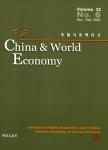Korea's Economic Growth and Catch-up: Implications for China
Korea's Economic Growth and Catch-up: Implications for China作者机构:Professor of Economics and Director of the Asiatic Research Institute Korea University
出 版 物:《China & World Economy》 (中国与世界经济(英文版))
年 卷 期:2016年第24卷第5期
页 面:71-97页
核心收录:
学科分类:07[理学] 0712[理学-科学技术史(分学科,可授理学、工学、农学、医学学位)] 0701[理学-数学] 070101[理学-基础数学]
基 金:Korea University [K1613391] National Research Foundation of Korea [21B20130012603] Funding Source: Korea Institute of Science & Technology Information (KISTI), National Science & Technology Information Service (NTIS)
主 题:China convergence economic growth Korea structural change
摘 要:This study investigates the economic growth and catch-up of Korea over the past half century. Korea's growth experience confirms the prediction of a "conditional convergence" theory. Cross-country regression further suggests that Korea's strong catch-up to the USA is also attributable to its favorable growth factors such as strong investment, lower fertility, greater trade openness, and improvements in human resources and rule of law. However, as Korea catches up to the USA and its steady-state level in per worker output, it will be subject to a growth slowdown unless improvements are made in those growth factors. While manufacturing-oriented and export-oriented development has served Korea's success well, poor productivity performance in the services sector has hampered overall productivity growth, Korea's experience implies that China's potential growth rates are likely to slow in the coming decades due to the convergence effect and with the rebalancing toward a domestic consumption and services-based economy. China needs to upgrade its rule of law, reform state-owned enterprises and improve productivity, particularly in its services sector, to sustain strong growth.



